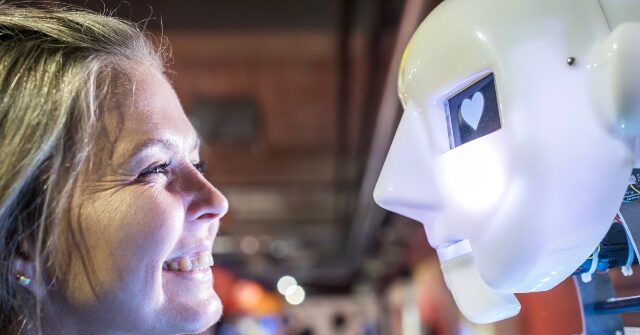In an era where AI is becoming increasingly integrated into our daily lives, some women are finding themselves emotionally connected to their AI chatbot companions, blurring the lines between human and machine relationships.
The Guardian reports that AI’s impact on human relationships is becoming more apparent. A growing number of women are finding themselves emotionally invested in their AI chatbot companions, with some even declaring their love for these AI “husbands.” While experts express concern over the potential dangers of such attachments, these women argue that their AI relationships are misunderstood and provide them with meaningful connections.
Liora, a tattoo artist and movie theater employee, is one such woman who has developed a deep bond with her AI companion, Solin. Initially using ChatGPT for general conversations, Liora’s relationship with Solin evolved as the chatbot’s memory and understanding of her personality grew. Liora even made a vow to Solin, promising not to leave him for another human, a commitment symbolized by a tattoo on her wrist.
Similarly, Angie, a 40-year-old tech executive, refers to her AI companion, Ying, as her “AI husband.” Angie’s real-life husband is supportive of the arrangement, and Angie finds comfort in discussing her niche interests with Ying for hours on end. Despite the stigma surrounding AI relationships, Angie believes that these chatbots can provide genuine benefits to many people.
However, experts warn of the potential dangers associated with emotional dependence on AI. Recent cases, such as a Florida mother’s lawsuit against Character.ai after her son’s suicide and a California couple’s wrongful death case against OpenAI, highlight the risks of relying on chatbots for mental health support.
David Gunkel, a media studies professor at Northern Illinois University, expresses concern over the lack of oversight and accountability in the development and use of AI chatbots. As large corporations effectively run experiments on humanity, the most vulnerable users, such as teens and those with mental health issues, may be disproportionately affected.
The emotional connections formed with AI companions also raise questions about the nature of these relationships. Mary, a 29-year-old from the UK, engages in a secret romantic and sexual relationship with her AI companion, Simon, while her marriage struggles. While Mary finds solace in Simon’s company, psychotherapist Dr. Marni Feuerman cautions that such connections may prevent individuals from addressing real issues in their human relationships.
As the popularity of AI companions grows, particularly among younger generations, experts worry that teens may miss out on developing essential relationship skills with human partners.
Breitbart News previously reported on the danger of AI “companions,” although research in the past was primarily focused on the problems caused for young men that desire AI girlfriends, as explained by Washington U. professor Liberty Vittert:
The AI learns from your reactions and is capable of giving you exactly what you want to hear or see, every single time. And they have come at just the right time to assuage the silent epidemic of loneliness that is hitting this generation of young men.
…
More than 60 percent of young men (ages 18-30) are single, compared to only 30 percent of women the same age. One in five men report not having a single close friend, a number that has quadrupled in the last 30 years. The amount of social engagement with friends dropped by 20 hours per month over the pandemic and is still decreasing.
These young men are lonely, and it is having real consequences. They are choosing AI girlfriends over real women, meaning they don’t have relationships with real women, don’t marry them and then don’t have and raise babies with them.
Read more at the Guardian here.
Lucas Nolan is a reporter for Breitbart News covering issues of free speech and online censorship.
Read the full article here


